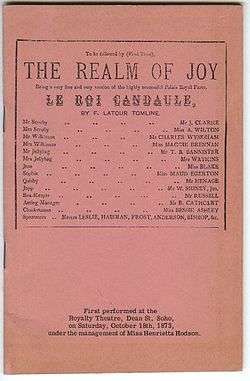The Realm of Joy

The Realm of Joy is a one-act farce by W. S. Gilbert, writing under the pseudonym "F. Latour Tomline". It opened at the Royalty Theatre on 18 October 1873, running for about 113 performances, until 27 February 1874.[1][2]
The play is based on the farce, Le Roi Candaule, by Henri Meilhac and Ludovic Halevy, two of Jacques Offenbach's favourite librettists.
Background
| “ | |
” |
| — W.S. Gilbert in The Era, 1872.[3] | ||
The Realm of Joy is set in the lobby of a theatre where a politically scandalous play, "The Realm of Joy" is being performed – a clear reference to Gilbert's play from the same year, The Happy Land (1873), which was still running on the first night of this piece.[4] The Lord Chamberlain had briefly banned The Happy Land for its political satire and for costuming its characters to resemble particular government officials,[5] which is lampooned in this play by references to "the Lord High Disinfectant" and by the descriptions of the banned costumes by Jane and Sophie.[6]
Gilbert likely used the pseudonym "Tomline" as a taunt to the Lord Chamberlain, as the pseudonym would already have been known from The Happy Land.[7] The Lord Chamberlain's Office licensed the play despite its provocative tone to prevent a round of bad publicity like the one which arose from the Happy Land affair.[8] Early in the run of the play, the title was changed to The Realms of Joy.[7]
In The Happy Land (1873), The Realm of Joy and Charity (1874), Gilbert pushed the boundaries of how far satire could go in the theatre. Charity moved beyond political satire to critique the contrasting ways in which Victorian society treated men and women who had sex outside of marriage, which anticipated the 'problem plays' of Shaw and Ibsen.[9]
Roles
| Box-Keeper[10] |
| Two Spectators |
| Cloakwoman |
| Spectator in Box |
| A Very Fat Gentleman |
| Quisby | } | Two "swells" |
| Jopp |
| Mr. Jellybag |
| Mrs. Jellybag, his wife |
| Jane | } | Their daughters |
| Sophie |
| Mr. Wilkinson |
| Mrs. Scruby (or Screwby, in the licensing copy) |
| Mr. Scruby, her husband |
| Acting Manager |
| Mrs. Wilkinson |
| Other spectators, etc. |
Synopsis

The scene is the box office lobby of a theatre where a politically scandalous play, implied to be Gilbert's contemporaneous play The Happy Land, is being produced. The play is so popular that spectators are literally crammed into the private boxes, sitting on each other's laps. The boxkeeper thinks that the play is scandalous, but "Society comes because Society is loth to believe in such audacity on mere hearsay, and flocks to the theatre in thousands to witness the appalling spectacle for themselves." Quisby and Jopp, a pair of "swells", arrive to see the play for the sixty-eighth and eighty-fifth time, respectively – but only to "moralise over the depravity of human nature" and "see the spectators". Mr. and Mrs. Jellybag have taken their young daughters (who interest Quisby and Jopp greatly) but arrange for them to be sent out with the cloakwoman whenever things get too scandalous. They're soon sent back out, and declare themselves much amused (A "melancholy instance of juvenile depravity" according to the cloakwoman.)
Meanwhile, Mr. Wilkinson has arrived with Mrs. Scruby. Mr. Scruby now arrives, waiting for Mrs. Wilkinson – but his box has been sold to another person as well. Both Mr. Scruby and Mr. Wilkinson have forbidden their wives from seeing the piece, and so have agreed to take each other's wives to it. Farcical complications ensue, with attempts to hide each other's wives from the other husband. In the confusion, the Jellybags' daughters give in to Quisby and Jopp's flirting and head off with them, unnoticed by the Cloakwoman. Everything comes out between the Scrubys and Wilkinsons, and, as they all were guilty of the same act, they forgive each other and go in to watch the show – but it's over! Ah, well! Now they can come as often as they like together.
Notes
- ↑ Crowther, p. 211
- ↑ Moss, Simon. "The Realms of Joy" at Gilbert & Sullivan: a selling exhibition of memorabilia, c20th.com, accessed 16 November 2009
- ↑ Stedman, pp. 106–07
- ↑ Stedman, pp. 108–09. Note that the titles, The Realm of Joy and The Happy Land are roughly synonymous.
- ↑ Stedman, p. 106.
- ↑ See Rees's introduction to the play.
- 1 2 Crowther, Andrew. The Realm of Joy, The Gilbert and Sullivan Archive, 2 February 1997, accessed 23 January 2017
- ↑ Stedman, pp. 109–10.
- ↑ Crowther, Andrew, Synopsis of Charity
- ↑ In the order given by Rees, that is, of appearance.
References
- Crowther, Andrew (2000). Contradiction Contradicted – The Plays of W. S. Gilbert. Associated University Presses. ISBN 0-8386-3839-2.
- Gilbert, W. S., The Realm of Joy, ed. Terence Rees, 1969, self-published, Nightingale Square, London. ISBN 0-9500108-1-2
- Stedman, Jane W. (1996). W. S. Gilbert, A Classic Victorian & His Theatre. Oxford University Press. ISBN 0-19-816174-3.
External links
- Background of play and link to synopsis
- Photo of the cover of the version of The Realm of Joy edited by Terrence Rees, which shows a cast list
- Information from a November 1873 programme of the play